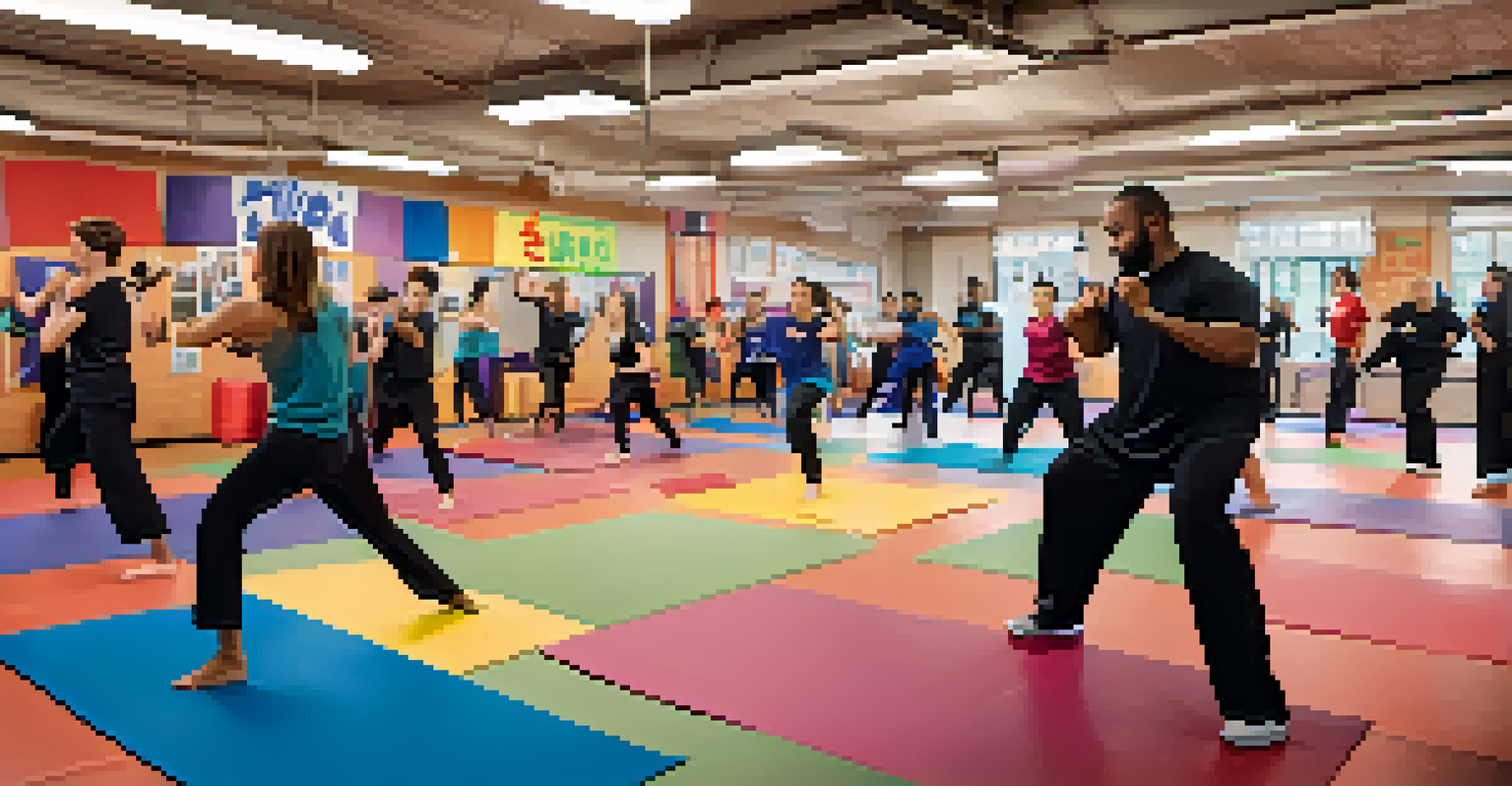Mental Resilience: Strength Through Self Defense Training

Understanding Mental Resilience in Everyday Life
Mental resilience is the ability to bounce back from setbacks and challenges, akin to a rubber band that stretches but doesn't break. It’s crucial in today’s fast-paced world, where stress can often feel overwhelming. Just like physical strength, mental resilience can be developed and nurtured over time through various practices.
It's not whether you get knocked down, it's whether you get up.
Self-defense training is one such practice that not only equips individuals with physical skills but also fosters a strong mental framework. By learning to confront fears and face adversities directly, people can cultivate a mindset that promotes resilience. This is especially relevant when faced with unexpected life challenges.
In essence, mental resilience is about developing a robust mindset that helps us navigate through life’s storms. Just like a tree that withstands the wind, resilient individuals learn to bend without breaking, adapting to changes while staying grounded in their values.
How Self-Defense Training Enhances Confidence
One of the most immediate benefits of self-defense training is a significant boost in self-confidence. When individuals learn techniques to protect themselves, they begin to feel more empowered and secure in their abilities. This newfound confidence often translates into other areas of life, from personal relationships to professional endeavors.

Imagine walking into a room full of strangers; a person with self-defense training might feel an underlying sense of assurance that can be felt in their posture and demeanor. This confidence acts like armor, helping individuals to face social situations without the anxiety that might have previously held them back. Over time, this empowerment reinforces their mental resilience.
Building Mental Resilience
Mental resilience, akin to a rubber band, can be developed through practices like self-defense training that help individuals adapt to life's challenges.
Moreover, the confidence gained through self-defense is not just about physical capability; it's about knowing that you have the tools to handle adversity. This mindset can be applied to tackle challenges, whether in the workplace or personal life, reinforcing the idea that you can overcome obstacles.
Facing Fear: A Core Component of Self-Defense Training
Fear is a natural response to perceived threats, but self-defense training teaches individuals how to confront and manage that fear. By placing themselves in controlled scenarios that simulate real-life situations, trainees learn to respond effectively rather than react impulsively. This process diminishes the power fear has over them.
Courage isn’t having the strength to go on—it is going on when you don’t have strength.
As individuals practice techniques and scenarios, they gradually learn that fear can be a motivator rather than a barrier. For example, in a sparring session, a trainee might feel their heart race, but they also learn to channel that adrenaline into focused action. This transformation is crucial for building resilience.
Ultimately, facing fear through self-defense not only prepares individuals for physical confrontations but also equips them with the mental tools to tackle life’s uncertainties. Each small victory against fear reinforces their ability to handle future challenges with greater ease.
Building Discipline and Routine Through Training
Self-defense training requires commitment, which naturally fosters discipline. Engaging in a regular training routine encourages individuals to establish habits that are beneficial not just in martial arts, but across all areas of life. This discipline translates to improved time management, goal setting, and consistency.
For instance, a person who commits to attending classes twice a week often finds themselves applying the same level of dedication to their work or personal projects. This newfound discipline helps create a structured approach to tackling challenges, reinforcing mental resilience in the face of adversity.
Boosting Confidence Through Training
Self-defense training enhances self-confidence, empowering individuals to face various life situations with assurance.
Moreover, as individuals see progress in their skills through consistent practice, they develop a growth mindset. They begin to understand that challenges and setbacks are part of the journey, further strengthening their ability to persevere through tough times.
The Power of Community in Self-Defense Training
Training in self-defense often fosters a sense of community among participants. This camaraderie is vital for mental resilience, as individuals find support in each other’s journeys. The shared experiences of facing fears and overcoming challenges create strong bonds that can be incredibly uplifting.
Imagine the encouragement felt when a training partner celebrates your progress or stands by you during a challenging drill. This supportive environment not only enhances the training experience but also reinforces the idea that you are not alone in your struggles. Community can be a powerful anchor in maintaining resilience.
Additionally, being part of a group encourages accountability, as members motivate each other to show up and give their best. This collective effort strengthens the mental resilience of each participant, reminding them that they can lean on others when times get tough.
Transforming Stress into Mental Strength
Self-defense training provides a unique outlet for stress management. As individuals engage in physical activity, they release endorphins, which are natural mood lifters, helping to alleviate feelings of anxiety and tension. This physical release is crucial for mental health and resilience.
Through the practice of self-defense techniques, individuals learn to channel their stress into focused, purposeful actions. For example, striking a pad during training can serve as a tangible way to release pent-up frustrations. This transformation of stress into strength fosters a healthier mindset.
Community Strengthens Resilience
The supportive community formed during self-defense training fosters mental resilience by providing encouragement and shared experiences.
Furthermore, the ability to manage stress through physical training reinforces the idea that challenges can be faced head-on. By learning to navigate stress effectively, individuals build a mental toolkit that prepares them for life's inevitable ups and downs.
Real-Life Applications of Resilience Through Self-Defense
The mental resilience developed through self-defense training has far-reaching applications in real life. For instance, individuals often find themselves better equipped to handle workplace pressures, family responsibilities, or personal challenges. The skills learned on the mat translate into everyday situations, making them more adept at problem-solving.
Consider someone who has trained in self-defense and faces a difficult conversation at work. The confidence and composure gained from training can help them approach the situation with a clear mind, making it easier to express themselves effectively. This adaptability is a hallmark of mental resilience.

Ultimately, the journey of self-defense training empowers individuals to tackle life’s challenges with a strong mindset. They learn that resilience is not just about enduring hardship, but about thriving in the face of it, turning obstacles into opportunities for growth.